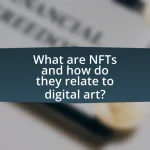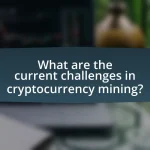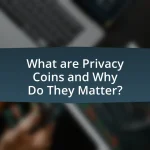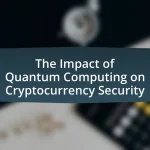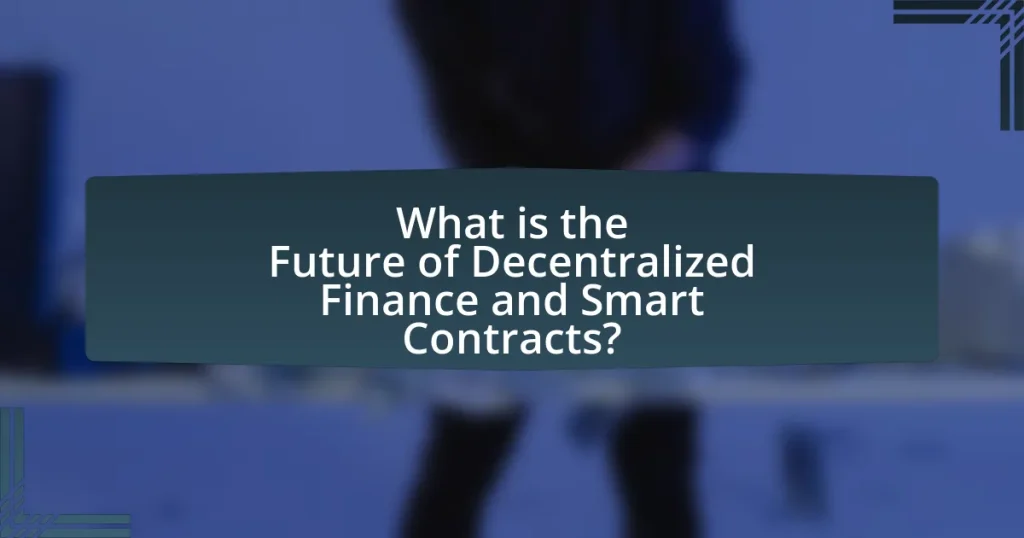The article focuses on the future of decentralized finance (DeFi) and the innovations in smart contracts that are driving its growth. It highlights the significant market interest in DeFi, with over $100 billion locked in protocols as of 2023, and discusses key features such as transparency, accessibility, and programmability. The interaction between DeFi and smart contracts is explored, emphasizing how smart contracts automate financial transactions, enhance security, and improve efficiency. Additionally, the article addresses emerging trends, challenges, and the implications of regulatory frameworks, while also providing practical steps for users to engage safely with DeFi projects.

What is the Future of Decentralized Finance and Smart Contracts?
The future of decentralized finance (DeFi) and smart contracts is poised for significant growth and innovation, driven by advancements in blockchain technology and increasing adoption. As of 2023, the total value locked in DeFi protocols has surpassed $100 billion, indicating strong market interest and investment. Innovations such as layer-2 scaling solutions, which enhance transaction speed and reduce costs, are expected to further facilitate DeFi’s expansion. Additionally, the integration of artificial intelligence and machine learning into smart contracts will likely improve automation and decision-making processes, making DeFi applications more efficient and user-friendly. Furthermore, regulatory clarity is anticipated to foster a safer environment for users, encouraging broader participation in DeFi ecosystems.
How do decentralized finance and smart contracts interact?
Decentralized finance (DeFi) and smart contracts interact by utilizing smart contracts to automate and facilitate financial transactions within DeFi ecosystems. Smart contracts are self-executing contracts with the terms of the agreement directly written into code, enabling trustless transactions without intermediaries. In DeFi, these smart contracts govern various financial services such as lending, borrowing, and trading, ensuring transparency and security. For instance, platforms like Aave and Uniswap rely on smart contracts to execute trades and manage liquidity pools, demonstrating their critical role in the operational framework of decentralized finance.
What are the key features of decentralized finance?
The key features of decentralized finance (DeFi) include transparency, accessibility, and programmability. Transparency is achieved through blockchain technology, which allows all transactions to be publicly verifiable, reducing the risk of fraud. Accessibility is a hallmark of DeFi, as it enables anyone with an internet connection to participate in financial services without the need for traditional banking intermediaries. Programmability refers to the use of smart contracts, which automate and enforce agreements without human intervention, enhancing efficiency and reducing costs. These features collectively empower users, promote financial inclusion, and foster innovation in the financial sector.
How do smart contracts facilitate decentralized finance?
Smart contracts facilitate decentralized finance by automating and enforcing financial agreements without intermediaries. They execute transactions based on predefined conditions coded into the blockchain, ensuring transparency and security. For instance, in lending platforms, smart contracts automatically manage loan agreements, disburse funds, and handle repayments, reducing the need for traditional banks. This automation minimizes human error and fraud, as the contract’s execution is immutable and verifiable on the blockchain. The use of smart contracts in decentralized finance has led to increased efficiency and lower costs, as evidenced by the rapid growth of DeFi platforms, which collectively hold billions in assets, demonstrating their effectiveness in transforming financial services.
Why is the future of decentralized finance important?
The future of decentralized finance (DeFi) is important because it has the potential to revolutionize traditional financial systems by increasing accessibility, transparency, and efficiency. DeFi platforms eliminate intermediaries, allowing users to engage in financial transactions directly, which can reduce costs and enhance user control over assets. According to a report by the World Economic Forum, decentralized finance could unlock $1 trillion in value by 2025, demonstrating its significant impact on the global economy. This shift towards DeFi is driven by innovations in smart contracts, which automate and enforce agreements without the need for a central authority, further solidifying the importance of DeFi’s future in transforming financial services.
What potential does decentralized finance hold for traditional finance?
Decentralized finance (DeFi) has the potential to revolutionize traditional finance by enhancing accessibility, reducing costs, and increasing efficiency. DeFi platforms operate on blockchain technology, allowing for peer-to-peer transactions without intermediaries, which can lower transaction fees and processing times. For instance, a report by the World Economic Forum indicates that blockchain could reduce financial services costs by up to 30%. Additionally, DeFi can provide financial services to unbanked populations, expanding access to loans, savings, and investment opportunities. This shift could lead to a more inclusive financial ecosystem, ultimately challenging the existing structures of traditional finance.
How can smart contracts enhance transparency and security?
Smart contracts enhance transparency and security by automating and enforcing agreements through code on a blockchain. This automation eliminates the need for intermediaries, reducing the risk of fraud and manipulation. The immutable nature of blockchain ensures that once a smart contract is deployed, its terms cannot be altered, providing a clear and verifiable record of transactions. Additionally, all participants in the network can access the same information, fostering trust and accountability. According to a report by the World Economic Forum, smart contracts can significantly reduce transaction costs and increase efficiency in various sectors, further validating their role in enhancing transparency and security.

What innovations are shaping the future of decentralized finance?
Innovations shaping the future of decentralized finance include automated market makers (AMMs), yield farming, and cross-chain interoperability. AMMs, such as Uniswap, enable users to trade assets without traditional order books, enhancing liquidity and accessibility. Yield farming incentivizes users to provide liquidity in exchange for rewards, driving participation in DeFi ecosystems. Cross-chain interoperability allows assets and data to move seamlessly between different blockchain networks, fostering collaboration and expanding the DeFi landscape. These innovations collectively enhance efficiency, accessibility, and user engagement in decentralized finance.
How are new technologies influencing smart contracts?
New technologies are significantly influencing smart contracts by enhancing their functionality, security, and interoperability. For instance, advancements in blockchain technology, such as Ethereum 2.0, improve scalability and reduce transaction costs, enabling more complex smart contracts to operate efficiently. Additionally, the integration of artificial intelligence allows for automated decision-making processes within smart contracts, increasing their adaptability to real-world conditions. Furthermore, the development of cross-chain protocols facilitates interaction between different blockchain networks, broadening the applicability of smart contracts across various platforms. These technological innovations collectively contribute to the evolution of smart contracts, making them more robust and versatile in decentralized finance applications.
What role does blockchain technology play in smart contract innovation?
Blockchain technology serves as the foundational infrastructure for smart contract innovation by providing a decentralized, immutable, and transparent environment for executing agreements. This technology enables smart contracts to automatically enforce and execute terms without intermediaries, reducing the risk of fraud and increasing efficiency. For instance, Ethereum, a leading blockchain platform, allows developers to create complex smart contracts that can facilitate various decentralized applications, demonstrating the practical application of blockchain in this domain. The immutability of blockchain ensures that once a smart contract is deployed, its code cannot be altered, which enhances trust among parties involved.
How are layer 2 solutions improving decentralized finance?
Layer 2 solutions are improving decentralized finance by enhancing transaction speed and reducing costs on blockchain networks. These solutions, such as Optimistic Rollups and zk-Rollups, enable off-chain processing of transactions, which alleviates congestion on the main blockchain. For instance, Ethereum’s layer 2 solutions can process thousands of transactions per second compared to the main chain’s limitations, significantly lowering gas fees. This scalability allows decentralized finance applications to serve a larger user base, facilitating more efficient trading, lending, and borrowing activities. As a result, layer 2 solutions contribute to a more accessible and user-friendly decentralized finance ecosystem.
What are the emerging trends in decentralized finance?
Emerging trends in decentralized finance (DeFi) include the rise of automated market makers (AMMs), the integration of non-fungible tokens (NFTs) into financial products, and the increasing use of layer-2 scaling solutions. AMMs, such as Uniswap, facilitate trading without traditional order books, enhancing liquidity and accessibility. The incorporation of NFTs allows for unique asset representation and fractional ownership, expanding investment opportunities. Layer-2 solutions, like Optimism and Arbitrum, improve transaction speeds and reduce costs, addressing scalability issues inherent in Ethereum. These trends reflect a shift towards more efficient, user-friendly, and innovative financial systems within the DeFi landscape.
How is the integration of AI impacting smart contracts?
The integration of AI is enhancing smart contracts by enabling automated decision-making and improving contract execution efficiency. AI algorithms can analyze vast amounts of data to predict outcomes and optimize contract terms, thereby reducing the need for manual intervention. For instance, AI can facilitate dynamic contract adjustments based on real-time data inputs, such as market conditions or user behavior, which enhances adaptability and responsiveness. Additionally, AI-driven analytics can identify potential risks and anomalies in contract performance, allowing for proactive management and mitigation strategies. This integration ultimately leads to more reliable and efficient decentralized finance systems, as evidenced by projects like OpenLaw, which leverage AI to automate legal agreements and streamline processes.
What are the implications of cross-chain interoperability?
Cross-chain interoperability enables different blockchain networks to communicate and share data, significantly enhancing the functionality and usability of decentralized finance (DeFi) applications. This capability allows users to transfer assets seamlessly across various platforms, increasing liquidity and market efficiency. For instance, projects like Polkadot and Cosmos facilitate cross-chain interactions, which can lead to a more interconnected DeFi ecosystem. The implications also include reduced reliance on centralized exchanges, as users can trade assets directly across chains, thereby minimizing counterparty risk and enhancing security. Furthermore, cross-chain interoperability fosters innovation by allowing developers to leverage the unique features of multiple blockchains, ultimately driving the evolution of decentralized applications.

What challenges does decentralized finance face in the future?
Decentralized finance (DeFi) faces several significant challenges in the future, including regulatory uncertainty, security vulnerabilities, and scalability issues. Regulatory uncertainty arises as governments worldwide grapple with how to classify and regulate DeFi platforms, which can hinder innovation and user adoption. Security vulnerabilities are a critical concern, as numerous DeFi projects have experienced hacks and exploits, leading to substantial financial losses; for instance, in 2021 alone, DeFi protocols lost over $1.3 billion to hacks. Scalability issues also pose a challenge, as many DeFi applications operate on blockchain networks that struggle to handle high transaction volumes, resulting in slow processing times and increased fees. These challenges must be addressed for DeFi to achieve widespread acceptance and functionality.
What regulatory hurdles must decentralized finance overcome?
Decentralized finance (DeFi) must overcome several regulatory hurdles, including compliance with anti-money laundering (AML) and know your customer (KYC) regulations. These regulations are essential for preventing illicit activities and ensuring that financial systems are not exploited for fraud or money laundering. For instance, the Financial Action Task Force (FATF) has issued guidelines that require virtual asset service providers to implement AML measures, which poses a challenge for DeFi platforms that prioritize user anonymity. Additionally, regulatory clarity around securities laws is necessary, as many DeFi tokens may be classified as securities, requiring registration and compliance with securities regulations. The lack of a unified regulatory framework across jurisdictions further complicates the landscape, as DeFi projects must navigate varying laws and regulations globally.
How can compliance be achieved without sacrificing decentralization?
Compliance can be achieved without sacrificing decentralization by implementing regulatory technology (RegTech) solutions that operate on decentralized networks. These solutions utilize smart contracts to automate compliance processes, ensuring adherence to regulations while maintaining the autonomy of decentralized systems. For instance, blockchain-based identity verification can facilitate Know Your Customer (KYC) requirements without centralizing user data, thus preserving user privacy and control. This approach aligns with the principles of decentralized finance (DeFi), where transparency and security are paramount, as evidenced by the increasing adoption of decentralized identity protocols that comply with regulations while empowering users.
What are the risks associated with smart contracts?
The risks associated with smart contracts include coding errors, security vulnerabilities, and legal ambiguities. Coding errors can lead to unintended consequences, as seen in the DAO hack of 2016, where a vulnerability allowed attackers to drain $60 million worth of Ether due to flawed code. Security vulnerabilities can expose smart contracts to attacks, such as reentrancy attacks, which exploit the contract’s execution flow. Additionally, legal ambiguities arise from the lack of regulatory frameworks governing smart contracts, potentially leading to disputes over contract enforcement and interpretation. These risks highlight the importance of thorough testing and auditing in smart contract development.
How can security be enhanced in decentralized finance?
Security in decentralized finance can be enhanced through the implementation of robust smart contract audits and the use of multi-signature wallets. Smart contract audits identify vulnerabilities before deployment, reducing the risk of exploits; for instance, a study by ConsenSys found that 70% of smart contracts contain security flaws. Multi-signature wallets require multiple approvals for transactions, which mitigates the risk of unauthorized access. By combining these strategies, decentralized finance platforms can significantly improve their security posture.
What best practices should be followed for smart contract development?
Best practices for smart contract development include thorough testing, code audits, and adherence to established standards. Thorough testing ensures that the contract behaves as expected under various conditions, reducing the risk of vulnerabilities. Code audits by independent experts help identify potential security flaws and improve overall reliability. Adhering to established standards, such as ERC-20 for tokens, promotes interoperability and reduces the likelihood of errors. These practices are essential for creating secure and efficient smart contracts, as evidenced by the high-profile failures in the past, such as the DAO hack in 2016, which resulted from inadequate testing and security measures.
How can audits and testing improve smart contract reliability?
Audits and testing enhance smart contract reliability by identifying vulnerabilities and ensuring compliance with specified requirements. Through systematic examination, audits reveal coding errors, logical flaws, and security weaknesses that could lead to financial losses or exploitation. For instance, the 2016 DAO hack, which resulted in a loss of $60 million, highlighted the critical need for thorough audits. Testing, including unit tests and formal verification, further ensures that smart contracts behave as intended under various conditions, thereby increasing trust among users and stakeholders. Together, these practices significantly reduce the risk of failures and bolster the overall integrity of decentralized finance applications.
What practical steps can users take to engage with decentralized finance?
Users can engage with decentralized finance by creating a cryptocurrency wallet, which allows them to store, send, and receive digital assets securely. After setting up a wallet, users should acquire cryptocurrencies, such as Bitcoin or Ethereum, through exchanges or peer-to-peer platforms. Once they have cryptocurrencies, users can participate in decentralized applications (dApps) that offer services like lending, borrowing, and trading without intermediaries. Engaging with decentralized exchanges (DEXs) enables users to trade assets directly with others, enhancing their involvement in the DeFi ecosystem. Additionally, users can explore yield farming and liquidity mining opportunities to earn rewards by providing liquidity to various protocols. These steps are supported by the rapid growth of the DeFi sector, which saw a total value locked (TVL) exceeding $100 billion in 2021, indicating significant user participation and investment in decentralized finance.
How can individuals safely invest in decentralized finance projects?
Individuals can safely invest in decentralized finance projects by conducting thorough research, utilizing reputable platforms, and diversifying their investments. Researching involves analyzing the project’s whitepaper, team credentials, and community feedback to assess legitimacy and potential risks. Utilizing reputable platforms ensures that transactions are secure and that the project adheres to regulatory standards. Diversifying investments across multiple projects reduces exposure to any single project’s failure, thereby mitigating risk. According to a report by the World Economic Forum, the DeFi market has grown significantly, highlighting the importance of informed investment strategies to navigate its volatility and complexity.
What resources are available for learning about smart contracts?
Resources available for learning about smart contracts include online courses, documentation, and community forums. Platforms like Coursera and Udemy offer structured courses on blockchain and smart contracts, while the Ethereum Foundation provides comprehensive documentation on developing smart contracts using Solidity. Additionally, community forums such as Stack Exchange and Reddit allow learners to engage with experts and peers, facilitating knowledge sharing and problem-solving. These resources collectively support a robust understanding of smart contracts and their applications in decentralized finance.



